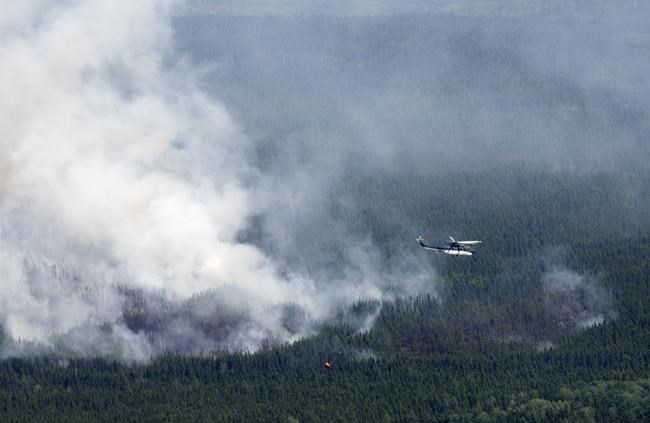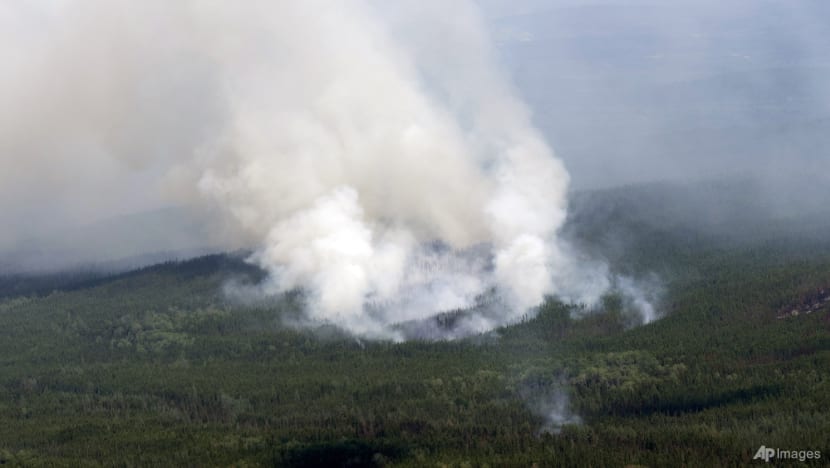Record-breaking wildfire season will continue for months: officials

OTTAWA — Canada's record-breaking wildfire season will continue to be abnormally intense throughout July and into August, Natural Resources Canada projected Thursday, posing a greater threat to the safety and health of communities across the country.
The wildfire season has been unusually severe this year, breaking historical records on the amount of land burned and affecting communities that are unaccustomed to dealing with the flames and smoke.
"The risk of forest fires is going to remain very high," Michael Norton, director general with the Canadian Forestry Service, said at a briefing Thursday.
Atlantic provinces and eastern Quebec are expected to see more normal conditions in August, but other parts of the country can expect the severity forecast to be well above average, projections show.
The forecasts are based on anticipated high temperatures, dry conditions and historical comparisons, Norton said.
The flames have threatened critical infrastructure and forced evacuations while the prolonged exposure to smoke has created potentially dangerous conditions, particularly for people with pre-existing health concerns.
The months of intense fires spread out between British Columbia and the Atlantic provinces has also stretched Canada's firefighting capacity, and the government has called in 3,258 international firefighters to help over the course of the season.
Despite the ongoing challenge, Norton said the government is confident they'll be able to sustain the number of firefighters needed until the flames die down.
Canada surpassed the known historic record for total area burned by wildfires in one season on June 27, with months of hot weather still to come.
The number of fires has more than doubled since that month, from 323 active fires at the beginning of June to 656 this week.
Some 88,000 square kilometres have burned as of July 5. Put together the burned land is be larger than the size of Lake Superior, and nearly 11 times the average amount burned by that date over the past 10 years.
More Canadians have been evacuated from their homes this year than in the last four decades, with more than 155,000 forced to leave due to fire and smoke.
Earlier in the season, the majority of fires were thought to have been caused by human activity, but since June 1 almost three in four fires are confirmed to have been started by lightning.
Emergency Preparedness Minister Bill Blair said he expected this season would be difficult when it began months earlier than typically anticipated, calling the weather projections at that time "sobering and concerning."
Long and intense fire seasons have become more common in Canada, however, and the minister said climate change is to blame.
"I would not want to suggest that this is the new normal," he said at an online press conference Thursday.
"Given the difficult conditions, the concerning conditions that persist right across many parts of the country, I think it's very important that Canadians be aware of their risk, that they take the steps that are necessary to prepare."
The risk isn't only to communities threatened by nearby fires, but also from the smoke that can travel great distances and settle over communities for days at a time.
The smoke can be particularly dangerous for people with heart and lung conditions, and Health Canada recommends people stay indoors in well-ventilated areas when the air quality is poor.
For most people, though, overheating can be worse than breathing smoke, said chief public health officer Dr. Theresa Tam.
"If you did not have air conditioning and it's too warm to stay inside with the windows closed, seek out a local cooling or clean air space," she advised.
"If you must spend time outside, consider using a well-fitted respirator type mask, like an N95, to reduce exposure to the fine particles from wildfire smoke."
Provincial and federal governments haven't tallied up the costs associated with this fire season yet, but expect the final figure will be considerable, given the record-breaking conditions.
"I believe the cost of this one will be as high as this event has been extreme in its impact across the country," Blair said.
This report by The Canadian Press was first published July 6, 2023.
— With files from Mia Rabson.
Laura Osman, The Canadian Press
Wildfires 'off the charts' in Canada as temperatures climb
Smoke rises as a wildfire burns south of Lebel-sur-Quevillon, Quebec, Wednesday, Jul 5, 2023. (Adrian Wyld/The Canadian Press via AP)
08 Jul 2023
MONTREAL: The number of forest fires continues to rise in Canada, climbing on Friday (Jul 7) to more than 670 blazes - more than 380 of them out of control - with a long and difficult summer ahead.
"The numbers are literally off the charts, with at least three more months left in the active wildfire season," said Michael Norton of the Canadian Ministry of Natural Resources.
And weather forecasts for the coming weeks predict above-average temperatures in many parts of the country in the west, and also in northern Quebec, the worst-hit region.
With nine million hectares already gone up in smoke - 11 times the average for the last decade - the absolute annual record set in 1989 has been surpassed.
Authorities tallied 677 active fires in the country on Friday, with 13 new blazes discovered during the day, including 386 that were burning out of control.
About 155,000 people have been forced to leave their homes at some point due to the fires since the beginning of May, the highest figure for 40 years.
"It's no understatement to say that the 2023 fire season is and will continue to be record-breaking in a number of ways," Norton said, adding that he expected the number of fires to remain above average throughout the summer.
The fires ravage areas on both sides of the country, and areas unaccustomed to fires are affected.
One of the forest fires in northern Quebec alone burned more than one million hectares.
"From evacuations to poor air quality and extreme heat warnings, we are experiencing the reality of climate change effects," Health Minister Jean-Yves Duclos said.
Related:
Fires intensify in Canada, could last 'all summer'
This has forced authorities to rely on an unprecedented level of international aid to support the 3,800 Canadian firefighters on the ground, backed up by the Canadian Armed Forces.
"The firefighting effort has now truly become a global effort," Norton said.
A total of over 3,000 international firefighters - hailing from countries including New Zealand, Chile, Costa Rica, Mexico, Spain and South Korea - are hard at work tackling the mega-fires.
Smoke from the fires so far this season has fouled the air in Canada and neighbouring United States, affecting more than 100 million people, at times disrupting flights and forcing the cancellation of outdoor events.
Source: AFP/gs
Wildfires in Canada have broken records for area burned, evacuations and cost, official says
Wildfires raging across Canada have already broken records for total areas burned, the number of people forced to evacuate their homes and the cost of fighting the blazes, and the fire season is only halfway finished
ByThe Associated Press
July 6, 2023,

Smoke billows from the Donnie Creek wildfire burning north of Fort St. John, British Columbia, Canada, Sunday, July 2, 2023. (AP Photo/Noah Berger, File)
VANCOUVER, British Columbia -- Wildfires raging across Canada have already broken records for total area burned, the number of people forced to evacuate their homes and the cost of fighting the blazes, and the fire season is only halfway finished, officials said Thursday.
“It’s no understatement to say that the 2023 fire season is and will continue to be record breaking in a number of ways,” Michael Norton, director general, Northern Forestry Centre, Canadian Forest Service, said during a briefing.
A health expert also warned that smoke from the fires can cause health problems for people living in both Canada and the United States.
“When you’re emitting large amounts of fire smoke into the air, and that smoke is reaching populated areas, there will be health effects,” said Ryan Allen, a professor of health sciences at Simon Fraser University in Burnaby, British Columbia.
Norton said warm weather and dry conditions across Canada indicate the potential for higher-than-normal fire activity through July and August.
“Drought is a major contributing factor affecting parts of all provinces and territories, intensifying in some regions,” he said. “When coupled with forecasts for ongoing above normal temperatures across most of the country, it is anticipated that many parts of Canada will continue to see above normal fire activity."
As of Wednesday, there were 639 active fires burning in Canada with 351 of them out of control. So far this year there have been 3,412 fires, well above the 10-year average of 2,751, said Norton.
The fires have burned 8.8 million hectares (27.7 million acres) an area about the size of the state of Virginia. This already exceeds the record of 7.6 million hectares (18.7 million acres) set in 1989 and is 11 times the 10-year average experienced by this date.
“The final area burned for this season may yet be significantly higher,” said Norton. “What we can say with certainty right now is that 2023 is a record-breaking year since at least since 1986 when accurate records started to be kept.”
Allen said the fine particles found in fire smoke not only have the ability to penetrate deep into airways, they also can travel long distances meaning they could drift far into the U.S.
There have been reports that fires in Eastern Canada and Quebec are affecting air quality in Europe
Allen said higher concentrations of smoke increases health risks to the lungs, brain, cognitive functions and even fetal development.
“As you get very far away, it’s unlikely the concentration would be as high as they are in close proximity to the fire and therefore the health risk would be lower, but the health risk is probably not zero,” he said.
Norton said the fires have forced an estimated 155,856 evacuees, the highest number in the last four decades. Currently about 4,500 people remain under evacuation orders across the country with about 3,400 in Indigenous communities.
Fighting the fires has taken on a global proportion.
There are about 3,790 provincial firefighters battling the blazes across the country being assisted by Canadian Armed Forces personnel. Another 3,258 firefighters from Australia, South Africa, New Zealand, the U.S., Chile, Costa Rica, Mexico, Spain, Portugal, South Korea and the European Union have travelled to Canada to fight fires.
Norton said the cost of fighting wildfires has steadily grown and is approaching about CDN$1 billion (US$750 million) a year.
“With the scale of this year’s activity and the fact we’ve still got three months left, there’s no question in my mind the direct cost of suppression will be a new record,” he said.
No comments:
Post a Comment